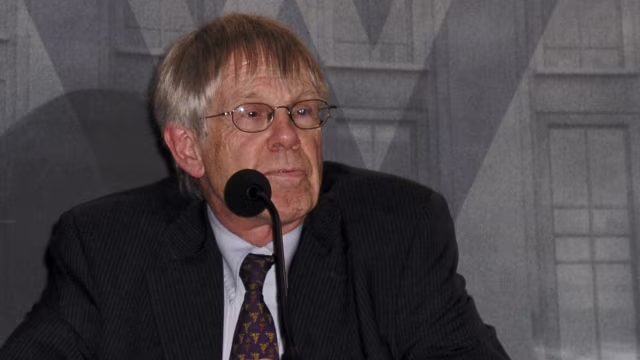New Book Debunks Myths About RFE/RL’s Early Years

WASHINGTON, DC — “Radio Free Europe and Radio Liberty: The CIA Years and Beyond,” the new book by RFE/RL historian A. Ross Johnson, was unveiled on January 20 at the Woodrow Wilson Center in Washington, D.C. At the event, Johnson laid out the case that – contrary to conventional wisdom – the CIA played a positive role during RFE and RL’s early years.
“I wrote the book primarily to debunk some of the myths surrounding the two organizations,” Johnson said, “and to honor the brave men and women behind the Iron Curtain who wanted to tell the story straight.”
According to Johnson, a 20-year veteran of Radio Free Europe/Radio Liberty, the CIA’s success in shielding the two services from espionage operations was of particular note. Also important was their concerted effort to respect the operational autonomy of the broadcasters in order to maintain objectivity in the eyes of the audience.
Contrary to conventional wisdom, the CIA played a positive role during RFE and RL’s early years.
Fellow scholar and a former policy planner at Radio Liberty Stephen Larrabee spoke glowingly of Johnson’s most recent work:
“The book was able to maintain scholarly objectivity throughout,” he said, “by painting a picture of the service as it really was, complete with all of its successes as well as a dedication to discussing its mistakes by putting things into proper context. His ability to clear up the outstanding myths was an important accomplishment.”
Elez Biberaj, a thirty year veteran of Voice of America, said, “Dr. Johnson highlights a critical theme in the book, which is that foreign broadcasting can only reinforce the antipathy one feels toward their current regime. It cannot create resistance out of thin air.”
But how can one measure impact? When an audience member posed this critical question, Larrabee was quick to jump in. “Reach is important, impact is reach with consequences. We know the regimes took the broadcasts seriously because they employed many countermeasures such as radio jamming. Testimony of key opposition figures helped illustrate to us just how instrumental these services were in breaking the censorship wall and keeping people in touch as well as informed.”
Former government officials talked about how these services forced them to change policy.
Biberaj agreed. “Former government officials talked about how these services forced them to change policy,” he said. “Radio broadcasting carried out by RFE and RL was important, but was just one of many factors that led to the downfall of communism.”
Maintaining objectivity is an important theme of the book and one that was repeatedly referenced during the hour and a half panel discussion. Johnson concluded the panel appropriately, with a cautionary reminder of that directive. “The most important thing for effectiveness,” he said, “is credibility of the message. Especially when you are in an information rich environment you need to have something free of bias and spin.”
–Jeff Swafford
